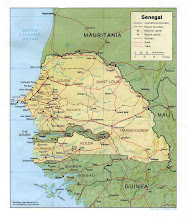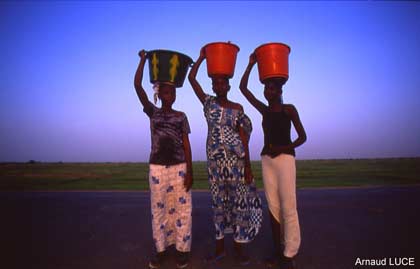Saturday, November 22, 2008
Senegal congress environmental department budget misses chance to pick up the garbage
Senegal's government cut the budget slightly this year to the Environment Ministry, but not before representatives deplored the state of garbage in the country. The $67.7 million (U.S.) environmental budget approved is down several million from the last adopted budget. Deputies in the National Assembly voiced their concerns that the garbage ringing Senegal's cities is creating a health hazard. The town of Kaolack, in the heart of the country's groundnut crop region voiced special concerns. The government responded that APIX, the foreign investment agency, and the city of Dakar are working on addressing the growing garbage problem as well as the closure of Mbeubeubus, the nation's sole actual landfill... Other environmental concerns such as fisheries and wildfires were noted as affected by the lowered environmental budget. But it is the garbage problem which Senegalese are most concerned about, according to the article Le Quotidien.
Labels:
budget,
Dakar,
environmental,
Senegal,
solid waste management
Saturday, November 15, 2008
IMF criticises Dakar for its "slow pay" history on infrastructure work
Previous posts have highlighted the Dakar central govern-ment's "slow pay" history on the Touba infrastructure projects. In the euphemistic terminology of the IMF, a statement following last September's report indicates it is aware of the problem:
"The mission evaluated the serious budgetary slippages that were uncovered in early August 2008. They comprise a large stock of unpaid bills to the private sector within the normal budgetary framework that have accumulated over the last few years, as well as past extrabudgetary spending, which, taken together, were inconsistent with the availability of financing and Senegal's macroeconomic circumstances. While a full assessment of the stock of unpaid bills is ongoing, their extent and lack of consis-tency with the budgetary framework warrant strong actions."
More recent posts here note that President Wade's visit to Touba this week was accompanied by some major payment installments on the Chinese infrastructure work there. One wonders however what result will come of the IMF's "full assessment" of the unpaid bills.
"The mission evaluated the serious budgetary slippages that were uncovered in early August 2008. They comprise a large stock of unpaid bills to the private sector within the normal budgetary framework that have accumulated over the last few years, as well as past extrabudgetary spending, which, taken together, were inconsistent with the availability of financing and Senegal's macroeconomic circumstances. While a full assessment of the stock of unpaid bills is ongoing, their extent and lack of consis-tency with the budgetary framework warrant strong actions."
More recent posts here note that President Wade's visit to Touba this week was accompanied by some major payment installments on the Chinese infrastructure work there. One wonders however what result will come of the IMF's "full assessment" of the unpaid bills.
Power du jour: solar (yesterday, nuclear, tomorrow...)
There appears to be growing enthusiasm lately for solar energy by the Senegalese authorities. At last spring's UNIDO renewable energy conference at the President Meridian (which I attended ex-officio), nuclear power was touted by the Wade administration. I don't know if the security and other concerns with nuclear have dampened that enthusiasm (which non-U.S. developed countries were frowning upon). But solar does have advantages of decentralized, scalable features. Here's the top of today's Reuters story:
"DAKAR (Reuters) - Senegal hopes to rein in surging electricity prices, reduce frequent blackouts and power most of its street lighting through an energy policy using solar panels, the government said Friday.
"Located on Africa's west coast at one end of the arid Sahel belt south of the Sahara, Senegal has huge solar potential but has so far lacked the expertise and investments to harness it."
"President Abdoulaye Wade, 82, instructed his energy minister to extend the national electricity grid over the entire country and build a factory making low-energy light bulbs, a government statement summing up Thursday's cabinet meeting said.
"U.S. space agency NASA scientists have identified a location in nearby Niger as the sunniest piece of land on earth, and renewable energy campaigners say the region has huge solar generating potential.
"'He (Wade) has also decided to put in place an energy-saving and management policy to lower prices for electricity consumers and reduce the negative effects of costs on our nation's economic development,' the government statement said.
"Like many African countries, Senegal has suffered long-term underinvestment and neglect of its power network. This has hampered economic development despite it being one of the region's most stable democracies since independence from France in 1960.
"Last month, crowds of youths smashed up offices of the state power utility Senelec in the capital Dakar to protest against frequent power cuts due to load-shedding.
"DAKAR (Reuters) - Senegal hopes to rein in surging electricity prices, reduce frequent blackouts and power most of its street lighting through an energy policy using solar panels, the government said Friday.
"Located on Africa's west coast at one end of the arid Sahel belt south of the Sahara, Senegal has huge solar potential but has so far lacked the expertise and investments to harness it."
"President Abdoulaye Wade, 82, instructed his energy minister to extend the national electricity grid over the entire country and build a factory making low-energy light bulbs, a government statement summing up Thursday's cabinet meeting said.
"U.S. space agency NASA scientists have identified a location in nearby Niger as the sunniest piece of land on earth, and renewable energy campaigners say the region has huge solar generating potential.
"'He (Wade) has also decided to put in place an energy-saving and management policy to lower prices for electricity consumers and reduce the negative effects of costs on our nation's economic development,' the government statement said.
"Like many African countries, Senegal has suffered long-term underinvestment and neglect of its power network. This has hampered economic development despite it being one of the region's most stable democracies since independence from France in 1960.
"Last month, crowds of youths smashed up offices of the state power utility Senelec in the capital Dakar to protest against frequent power cuts due to load-shedding.
Labels:
NASA,
power,
President Wade,
renewable energy,
Senegal,
solar,
United Nations
Tuesday, November 11, 2008
Government money appears in Touba in advance of President Wade's visit
President Abdoulaye's visit tomorrow to the Mourides' holy city of Touba has been greased by finally funding Touba infrastructure projects. The President needs to spread the goodwill, according to today's article in L'Observateur. The sacking of Macky Sall, leader of the Senegalese parliament is apparently fomenting ill feeling toward the president and the Mourides are backing off from their support for the President... Those sore feelings may be assauged somewhat by the reported payment this month to Chinese contractors working in Touba of 3.6 billion CFA francs. According to L'Observateur sources, 2 billion CFA francs were received by Hénan China and 1.6 billion by another company. Work on Touba infrastructure has been restarted, although Chinese and local employment on the projects is still far below the scheduled need... L'Observateur sources with the Khalife say they'll push for more funding for the projects from the President's central government. As we noted here earlier, Touba sent billions of francs (much of it raised abroad) to the central government, where it disappeared for quite awhile. The Khalife took up the matter in a visit to Dakar earlier this year. Only 30 percent of the contract Touba infrastructure has been completed.
Saturday, November 1, 2008
President Wade looks for better GOANA harvest
Six months after President Abdoulaye Wade launched his agricultural growth initiative, Senegal is predicting record harvests for 2008. Good news for Senegal and its president, both of which were battered by food shortages over the last year.
“The Grand Agricultural Offensive for Food Security” or GOANA, was launched by President Wade in May 2008. It aims for Senegal’s self-sufficiency in food production by 2015. Goals include doubling rice production, and increasing maize and manioc yields.
According to IRIN, Senegal imports 600,000 tons of rice a year, or three-quarters of the country’s food consumption, making its people vulnerable to high global rice prices, especially when energy costs boost transportation costs.
Six months into GOANA, the Ministry of Agriculture predicts a harvest of 1.8 million tons of cereal—a 136 percent increase over last year’s yields—700,000 tons of millet, 500,000 tons of maize and 380,000 tons of non-irrigated rice in 2008.
Thousands of supporters, farmers and members of agricultural organizations gathered opposite the presidential palace in Dakar October 27 to showcase harvests of peanuts, fonio, rice, millet, bananas and vegetables.
But according to the IRIN report, good rains may have had more to do with the higher yields than the government subsidized seeds or farm equipment that some farmers say didn’t reach them until past the planting season.
Still, it is a good start to the President’s worthy effort.
“The Grand Agricultural Offensive for Food Security” or GOANA, was launched by President Wade in May 2008. It aims for Senegal’s self-sufficiency in food production by 2015. Goals include doubling rice production, and increasing maize and manioc yields.
According to IRIN, Senegal imports 600,000 tons of rice a year, or three-quarters of the country’s food consumption, making its people vulnerable to high global rice prices, especially when energy costs boost transportation costs.
Six months into GOANA, the Ministry of Agriculture predicts a harvest of 1.8 million tons of cereal—a 136 percent increase over last year’s yields—700,000 tons of millet, 500,000 tons of maize and 380,000 tons of non-irrigated rice in 2008.
Thousands of supporters, farmers and members of agricultural organizations gathered opposite the presidential palace in Dakar October 27 to showcase harvests of peanuts, fonio, rice, millet, bananas and vegetables.
But according to the IRIN report, good rains may have had more to do with the higher yields than the government subsidized seeds or farm equipment that some farmers say didn’t reach them until past the planting season.
Still, it is a good start to the President’s worthy effort.
Labels:
agriculture,
food,
harvest,
President Wade,
rice,
Senegal
Subscribe to:
Posts (Atom)


